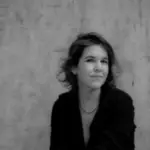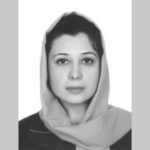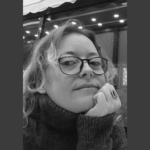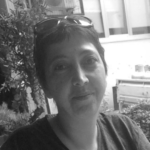
SPACE International Conference 2025 on Sustainable Architecture, Planning and Urban Design
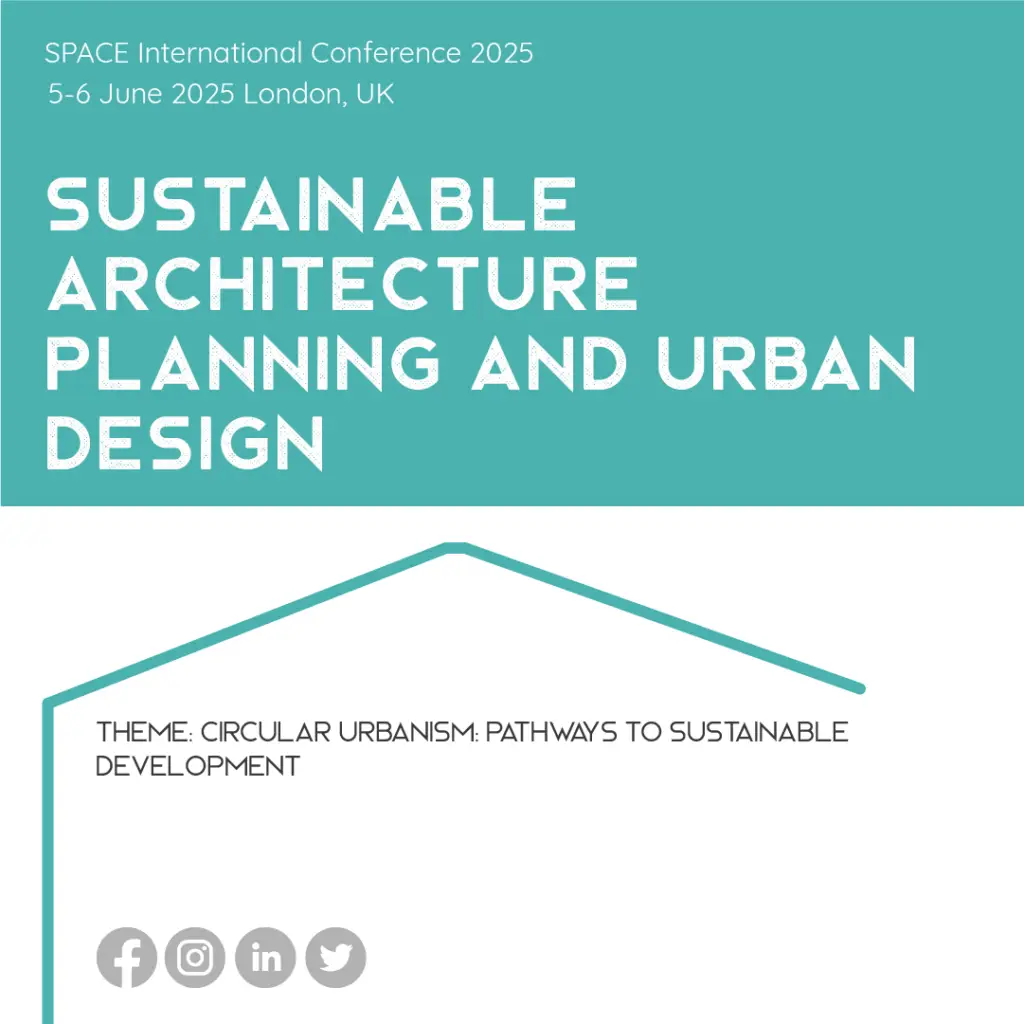
The 8th of the “SPACE International Conference 2025 on Sustainable Architecture, Planning and Urban Design” will be held in London on 5-6 June 2025, online and onsite (hybridly). The Conference will explore the transformative potential of circular urbanism in building sustainable and resilient cities under the theme “Circular Urbanism: Pathways to Sustainable Development“. As urban areas face increasing challenges from climate change, resource scarcity, and population growth, the need for innovative and adaptable urban models becomes paramount. Circular urbanism integrates circular economy principles into the design and management of urban environments, focusing on reducing waste, enhancing resource efficiency, and promoting regeneration.
We, as SPACE Studies, invite architects, planners, policymakers, and scholars to examine the pathways through which cities can transition from linear to circular models. The discussions will emphasise designing for longevity, recycling materials, adaptive reuse of existing infrastructure, and community-driven initiatives. Attendees will gain insights into the latest technological advancements, policy frameworks, and interdisciplinary collaborations shaping the future of sustainable urban development.
Our conferences at SPACE Studies are designed to provide an engaging and professional platform for academics, industry leaders, and practitioners to connect, collaborate, and share cutting-edge research in the fields of architecture, planning, and urban design as well as all interdisciplinary areas. With a proven track record of successful events, we uphold high standards, ensuring an enriching experience for all participants. Our International Advisory Board includes distinguished experts who help shape the quality and impact of our sessions.
Call for Papers
We welcome submissions from academics, industry professionals, and policymakers that engage with the theme Circular Urbanism: Pathways to Sustainable Development. We are particularly interested in contributions that showcase innovative practices, theoretical insights, and case studies. Suggested topics include:
- Applications of circular economy models in architecture and planning
- Adaptive reuse strategies for buildings and urban infrastructure
- Waste reduction, recycling technologies, and material efficiency in construction
- Policies and governance models fostering sustainable development
- Technological innovations supporting Circular Urbanism
- Community involvement and its impact on sustainable urban practices
Although our focus is on this theme, we also welcome contributions related to broader sustainability topics, such as (but not limited to):
- Sustainable materials and construction techniques
- Climate resilience and urban planning
- Renewable energy integration in architecture
- Green infrastructure and biodiversity in cities
- Social equity and sustainability
- Water management and sustainable landscapes
Call for Sessions
Are you interested in leading a session at the conference? We invite academics, professionals, and industry experts to propose sessions that align with our theme, Circular Urbanism: Pathways to Sustainable Development. Whether it is a panel discussion, thematic paper session, or interactive dialogue, this is an opportunity to engage with a targeted audience and contribute to the discourse.
Session Format:
• Each session lasts 1.5 hours.
• A distinguished speaker from the group will introduce the session with a 30-minute keynote-style presentation.
•Three additional presentations (20 minutes each) will follow, covering relevant research and discussions.
Group Registration & Discounted Rate:
• Sessions can accommodate 4 participants under a group registration package.
• Early Bird: £1,800 | Standard: £2,000 | Late Registration: £2,200
•If your group has more than 4 participants, additional members must register individually at standard rates.
Submission Process
To submit a session proposal, please follow these steps:
- At least one presenter must sign up and become a Basic Individual Member.
- Go to the Abstract Submission Dashboard and select “Session Submission” as the topic.
- Submit an abstract for the session in the designated abstract space (this will serve as the session description).
- Upload the following two files:
- File 1: A Word document containing all individual abstracts (title, abstract, and keywords) without author names.
- File 2: A separate document listing abstract titles along with author names, affiliations, and titles.
Call for Intensives
SPACE’s “Call for Intensives” is an opportunity to contribute to the conferences that incorporate a spectrum of possibilities, including but not limited to the presentation of a concept/notion, research in progress, or incomplete research demanding a start for potential future collaborations. The formats for the intensives are as follows.
- Format 1: Poster and PowerPoint presentation
- Format 2: PowerPoint presentation.
We aim to create opportunities for developing the research that has yet to be completed but needs external networking support for its full accomplishments. Intensives’ presentations are not separated from other presentations at the conferences. They perform as part of sessions to introduce and discuss these projects with the academics and professionals of various disciplines.
Requirements:
1. The initial submission should include an abstract of a maximum of 250 words. This short abstract would need to be fully presented in any of the two selected formats mentioned above. It is necessary to clearly state the main concern or question under investigation and the potential outcome(s) of the research. It is also recommended to include describing the research stage and your expectations, such as asking for advice, looking for potential collaborators or academic partners to develop the research, requiring suggestions on helpful references, etc.
2. Upon approval of the short abstract, the presenter should submit an extended abstract of up to 1000 words elaborating on further details. The extended abstract (and poster if you have one) will be published in the annual SPACE Conferences abstract book; thus, applying a minimum of 5 references is highly recommended.
Notes:
1- In the case of selecting the mode of “Poster and PowerPoint Presentation”, it is suggested to apply the presentation sizes “50x70cm” or “70x100cm” with the conference name and SPACE Logo on it and their place depending on your design. Other preferred sizes are unfortunately not acceptable as they will be placed on the conference webpage. Please remember that as our conferences are hybrid in terms of attendance (unless otherwise announced), we do not hang the posters at the conference venue, and you will need to prepare a PowerPoint presentation to present your work at the conference for a 15-20-minute time slot.
2- Intensive submissions for both on-site and virtual attendance should be registered from the Oral Presentation Category.
Call for Showcases: Industry, NGOs & Community Projects
We invite industry professionals, NGOs, researchers, startups, and community initiatives to participate in the Industry Showcase at our upcoming conference. This is an opportunity to present real-world projects, research, and innovative solutions that contribute to Circular Urbanism and sustainable development.
We are seeking submissions that offer insights, case studies, or practical applications—not promotional or purely commercial content.
Who can Apply?
We welcome submissions from:
✔ Industry professionals & companies developing sustainable solutions
✔ NGOs & community-led projects making a social and environmental impact
✔ Research institutes & academia working on circular urbanism innovations
✔ Startups & technology developers focused on sustainability
What Can Be Showcased?
- Community-driven projects that enhance local sustainability
- Circular economy principles applied in urban planning
- Sustainable construction methods and materials
- Technology & digital tools supporting circular urbanism
- Innovative business models for sustainability
- Policy-driven approaches to urban development
❗ Important Note:
This is not a marketing or product promotion opportunity. If your company wants to showcase commercial products or services, please register for an Exhibitor Booth instead.
Showcase Formats:
- On-Site Presentation – Present live at the conference venue
- Virtual Showcase – Contribute remotely and engage with a global audience
We encourage you to apply if your work contributes to Circular Urbanism and sustainable development.
Submission Process
To submit a session proposal, please follow these steps:
- At least one presenter must sign up and become a Basic Industry Member.
- Go to the Abstract Submission Dashboard and select “Session Submission” as the topic.
Submit an abstract describing your showcase (project, research, or initiative) in the designated space.
- Upload Supporting Files:
- File 1: A Word document containing a detailed description of the showcase, including key insights, case studies, or practical applications.
- File 2: Supporting visuals (images, diagrams, or a PDF overview) that help illustrate the showcase.
Review & Approval
Submissions will be reviewed by the Advisory Board (not blind peer-reviewed).
The board will assess whether the submission aligns with the conference theme and is not purely promotional or marketing content.
Important:
• If your submission focuses on a product or commercial service, you should register for an Exhibitor Booth instead of a showcase.
Submission and Guidelines
The SPACE International Journal of Conference Proceedings will publish full papers. It is an interdisciplinary, international academic, refereed journal designed to publish conference papers mainly presented at SPACE International Journal of Conference Proceedings. It is an online journal published twice a year by SPACE Studies Publications. All articles submitted to the SPACE International Conferences have undergone rigorous double-blind peer review by two referees based on initial editor’s screening.
Guidelines for the papers that will be submitted to the SPACE International Conferences are explained in detail on the Instructions for Authors page as part of the Journal specifically designed to publish the conference papers presented at our Conferences. These guidelines form the layout of the paper and involve a title, abstract (maximum of 250 words), keywords, sections and headings, tables, figures, equations, acknowledgements, references, figures, tables, and references. Please read the instructions, which detail everything you need to submit your conference paper to this Journal, and please follow them closely in order to ensure your paper matches all the requirements of the Journal.
You will not submit your full paper if you consider attending the Conference from the Oral Presentation Category. All the abstracts from the SPACE International Conferences are published in the Annual Conference Abstracts book at the end of each year. Your abstract will be published in the abstract book. If you prefer to publish an extended abstract and/or your poster, please email your preference to space@spacestudies.co.uk and upload the related document simply to the submission system.
The abstracts will be submitted via the website. The process will be as follows:
- Click the “Submit your abstract” button below.
- If you haven’t signed up yet, you must sign up to submit your abstract to the conference. So, when you click the “Submit your paper” button, the system will enable you to sign up.
- Once you log in, please go to the conference page you want to submit your paper and click “Submit your paper”. This will lead you to the submission page.
- Click “+ New Paper” to submit your abstract.
- Enter your title.
- You can directly text your abstract into the space given by deleting the instructions written for authors, or you can copy and paste your abstract to this area.
- A maximum of 250 words abstract is required and the space is limited to the required word count.
- The abstract should include the purpose of the research, research method, principal results and major conclusions.
- You need to add your keywords in the “Abstract Information” section. There must be a minimum of 4 and a maximum of 6 keywords.
- Select the topic you submit your abstract to on right-hand side of the page.
- Accept “Terms and Conditions”.
- Click the submit button.
The conference evaluation process covers abstract evaluation, so please do not attach any additional documents unless you are resubmitting your abstract or extended abstract and poster. Please do not include your or your co-author’s names either.
Once you are accepted, you may or may not need to resubmit, depending on the reviewer’s comments.
- If you choose to register from an oral presentation category, your full paper will not be published (but your abstract will be published), so if you have any comments that suggest that improvements are needed, that means that you still need to re-submit your abstract.
- If you choose to make a poster+PowerPoint Presentation, your abstract and poster will be published, so you must upload your poster even if there are no improvement suggestions advised by the reviewers.
- If you choose to be an author or virtual presenter, you must upload your full paper. Please submit your paper to the SPACE Studies Journal of International Conference Proceedings at this stage. Please be sure that you have all you need, which is listed on the Checklist before Submission section on the Instructions for Author page before submitting your paper. Once you are ready to submit, please use the submit button on the Journal’s pages and upload your documents as described.
If you are an oral presenter, after receiving the acceptance letter, you will submit your revised abstract (if needed), or extended abstract (depending on your preference but subject to reviewing and editing) and/or poster by logging in to the website.
- Click “+ New Paper” to submit your revised abstract.
- Enter your title and add “-Revised” to your title.
- You can directly text your abstract into the space given by deleting the instructions written for authors, or you can copy and paste your abstract to this area.
- You need to add your keywords in the “Abstract Information” section. There must be a minimum of 4 and a maximum of 6 keywords.
- Select the topic from the right-hand side of the page.
- Accept “Terms and Conditions”.
- Click the submit button.
- If you prefer to publish an extended abstract, please upload it before you submit your revised abstract.
Important Dates
11 October 2024
Abstract Submission Deadline
28 February 2025
21 March 2025
Extended Abstract Submission Deadline
6 April 2025
Notification of Acceptance for Extended Submission
20 April 2025
Last Call for Papers – Submission Deadline
19 May 2025
Notification of Submissions of Last Call for Papers
26 May 2025
4 April 2025
Abstract Submission Deadline for Oral/Poster Presentation
19 May 2025
Full-Paper Submission Deadline
26 May 2025
Standard Registration Deadline (for all Presenter Categories)
16 May 2025
Late Registration Deadline (for all Presenter Categories)
30 May 2025
Late Registration Deadline (for listeners)
6 June 2025
Presentation Submission Deadline
22 May 2025
Conference Dates
5-6 June 2025
Programme
Please note: Due to a number of accepted speakers being unable to obtain visas in time, we have had to condense the conference into a single day. The full revised schedule is provided below and can be downloaded from here.
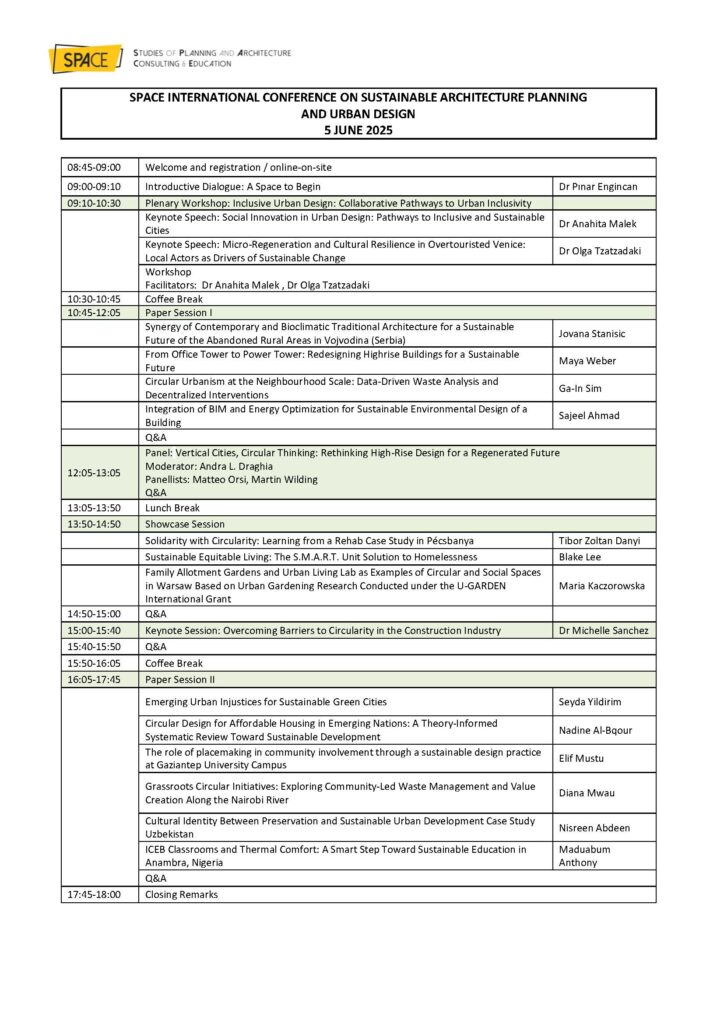
Programme Details
Opening
Plenary Session
Social Innovation in Urban Design: Pathways to Inclusive and Sustainable Cities by
Dr Anahita Malek (Associate Professor, Head of the Graduate School, Buckinghamshire New University)
In this keynote, Dr. Malek will explore how innovative urban design strategies can foster inclusivity, social cohesion, and sustainable development. Drawing on case studies from Europe and Asia, she will highlight the role of governance structures and practical approaches to addressing challenges in housing, public spaces, and cultural heritage.
Keynote Sessions
Micro-Regeneration and Cultural Resilience in Overtouristed Venice: Local Actors as Drivers of Sustainable Change by
Dr Olga Tzatzadaki (Postdoctoral Researcher, University Ca’Foscari of Venice-Italy)
In this keynote, Dr Tzatzadaki will examine how micro-regeneration initiatives led by local actors in Venice are fostering cultural resilience in the face of overtourism. Focusing on artisans, small business owners, and cultural entrepreneurs, the presentation draws on interviews and case-based research to explore how these grassroots efforts contribute to sustainable urban regeneration. It highlights the interplay between governance, community networks, and individual action in shaping a more inclusive and culturally grounded future for the city.
Overcoming Barriers to Circularity in the Construction Industry by
Dr Michelle Sanchez, Sustainability Lead, RSHP
The conference presentation highlights the key challenges the construction industry faces in achieving circularity, emphasising the need for systemic changes and industry-wide collaboration. One of the primary obstacles is the lack of comprehensive regulations that support circular practices, making it difficult for project teams to adopt sustainable strategies during all design stages. Additionally, the continuity of ownership poses a significant hurdle, as buildings proprietary often change hands multiple times during the life-cycle of that building, complicating the responsibility for reuse and recycling because of the lack of information on the existing building elements. The absence of clear rewarranties and recertifications further discourages the reuse of materials, as stakeholders struggle with liability and performance assurances. The transition to a circular economy remains slow and fragmented without addressing these regulatory and ownership challenges.
A crucial step toward circularity is the establishment of a central database to track materials throughout their lifecycle. This would be complemented by material passports, which provide essential information on the origin, composition, and reuse potential of the construction materials. Reuse reports and circular statements can further enhance transparency and accountability by documenting how materials are repurposed. However, even with improved documentation, effective circularity requires dedicated storage facilities to temporarily house reusable materials until they are needed for new projects. Without these structural improvements, achieving a fully circular construction industry will remain an ambitious yet unrealised goal.
Paper Sessions
Paper Sessions feature research presentations based on accepted abstracts. These sessions include both on-site and online contributions and represent a range of topics related to the conference theme.
Integration of BIM and Energy Optimization for Sustainable Environmental Design of a Building
Sajeel Ahmad
From Office Tower to Power Tower: Redesigning Highrise Buildings for a Sustainable Future
Maya Weber
Synergy of Contemporary and Bioclimatic Traditional Architecture for a Sustainable Future of the Abandoned Rural Areas in Vojvodina (Serbia)
Jovana Stanisic
Circular Urbanism at the Neighborhood Scale: Data-Driven Waste Analysis and Decentralized Interventions
Ga-In Sim
Emerging Urban Injustices for Sustainable Green Cities
Seyda Yildirim
The role of placemaking in community involvement through a sustainable design practice at Gaziantep University Campus
Elif Mustu
Circular Design for Affordable Housing in Emerging Nations: A Theory-Informed Systematic Review Toward Sustainable Development
Nadine Al-Bqour
Grassroots Circular Initiatives: Exploring Community-Led Waste Management and Value Creation Along the Nairobi River
Diana Mwau
Cultural Identity Between Preservation and Sustainable Urban Development Case Study Uzbekistan
Nisreen Abdeen
ICEB Classrooms and Thermal Comfort: A Smart Step Toward Sustainable Education in Anambra, Nigeria
Maduabum Anthony
Panel
Vertical Cities, Circular Thinking: Rethinking High-Rise Design for a Regenerated Future
This panel explores how tall buildings can move beyond iconic form to become flexible, circular, and regenerative systems. Through five interconnected themes, material reuse, modular strategies, adaptability, resource generation, and real-world case studies, architects, engineers, and BIM professionals will discuss how collaboration across disciplines can reshape the future of vertical urbanism.
Moderator: Andra L. Draghia, ALD Architecture
 Andra Draghia is a qualified architect with experience delivering large-scale residential and mixed-use developments in London. Passionate about sustainable design, digital coordination, and technical execution, she has worked across all project stages, from concept to construction. A strong believer in the transformative potential of vertical architecture, Andra is particularly drawn to the challenges and opportunities that tall buildings present in shaping dense urban environments. She is the Founder of ALD Architecture and currently serves as Regional Lead for Romania within the Women in BIM collective. She holds an Advanced Diploma from The Bartlett, UCL, with commendation in project delivery and risk management.
Andra Draghia is a qualified architect with experience delivering large-scale residential and mixed-use developments in London. Passionate about sustainable design, digital coordination, and technical execution, she has worked across all project stages, from concept to construction. A strong believer in the transformative potential of vertical architecture, Andra is particularly drawn to the challenges and opportunities that tall buildings present in shaping dense urban environments. She is the Founder of ALD Architecture and currently serves as Regional Lead for Romania within the Women in BIM collective. She holds an Advanced Diploma from The Bartlett, UCL, with commendation in project delivery and risk management.
Panellists:
Matteo Orsi, Head of BIM and Digital Design, MORRIS+COMPANY
 Matteo joined Morris+Company in 2021 graduating from Universitá degli Studi di Firenze with a Degree in public realm design. As an architect and Head of Digital, Matteo’s holistic approach, with a specific focus on R&D and processes, ensures a perfect marriage of technological and hands on expertise across all project stages, scales, and sectors. Specialising in software workstreams Matteo is a key champion of carbon reduction through digital tools.
Matteo joined Morris+Company in 2021 graduating from Universitá degli Studi di Firenze with a Degree in public realm design. As an architect and Head of Digital, Matteo’s holistic approach, with a specific focus on R&D and processes, ensures a perfect marriage of technological and hands on expertise across all project stages, scales, and sectors. Specialising in software workstreams Matteo is a key champion of carbon reduction through digital tools.
Martin Wilding, BIM Manager and Senior Associate Principal at Kohn Pedersen Fox (KPF)
 Martin Wilding is Head of BIM at global design firm KPF, guiding global BIM strategy and implementation since joining in 2013. A qualified architect and passionate technology enthusiast, he is part of the leadership of KPF’s global Design Technology team responsible for promoting and supporting the integration of technology in to design workflows across KPF’s worldwide offices. As both an architect and BIM leader Martin has worked on projects across a range of typologies and scales including aviation, supertall, commercial, residential, mixed-use and masterplan schemes.
Martin Wilding is Head of BIM at global design firm KPF, guiding global BIM strategy and implementation since joining in 2013. A qualified architect and passionate technology enthusiast, he is part of the leadership of KPF’s global Design Technology team responsible for promoting and supporting the integration of technology in to design workflows across KPF’s worldwide offices. As both an architect and BIM leader Martin has worked on projects across a range of typologies and scales including aviation, supertall, commercial, residential, mixed-use and masterplan schemes.
Martin is a co-founder of the Design Technology User Group hosting technology themed industry knowledge exchange events. He has spoken at numerous global conferences on BIM Management approaches and technology implementation.
Industry Showcases /Practice-Informed Research Sessions
These sessions feature either academic research projects engaging with industry challenges and practices, or industry-led initiatives that incorporate research alongside their professional activities. Each presentation offers insights grounded in real-world contexts and collaborations.
Solidarity with Circularity: Learning from a Rehab Case Study in Pécsbanya
Tibor Zoltan Danyi
Sustainable Equitable Living: The S.M.A.R.T. Unit Solution to Homelessness
Blake Lee
Family Allotment Gardens and Urban Living Lab as Examples of Circular and Social Spaces in Warsaw Based on Urban Gardening Research Conducted under the U-GARDEN International Grant
Maria Kaczorowska
Workshop(s)
Inclusive Urban Design: Collaborative Pathways to Urban Inclusivity
(1hrs)
Facilitator: Dr Anahita Malek (Associate Professor, Head of the Graduate School, Buckinghamshire New University) & Dr Olga Tzatzadaki (Postdoctoral Researcher, Ca’ Foscari University of Venice)
This interactive workshop will explore actionable social innovation strategies for integrating inclusivity into urban planning. Through case studies, participants will examine social innovation methods for sustainable development, cultural engagement, and community-building. The session will feature peer discussions and practical design exercises, equipping attendees with tools and insights to enhance inclusivity in diverse urban contexts, from dense cities to under-resourced regions.
Please note that the program may be subject to changes as we finalise speakers and sessions.
Keynote Speakers
Dr Michelle Sanchez, Sustainability Lead, RSHP

Michelle is an architectural designer and RSHP’s sustainability lead. With a PhD in Whole Life Carbon Assessment (WLCA) and Social Responsibility, she brings years of experience in multidisciplinary projects and environmental design, WLCA, embodied carbon, and energy efficiency.
Instrumental in promoting RSHP’s sustainable agenda, Michelle assesses and develops the sustainability of the practice’s projects in key stages, undertaking thermal modelling, WLC and embodied carbon calculations, and reviewing sustainability certifications.
A recognised thought leader in sustainable architecture, Michelle has contributed to major industry publications, including the ACAN Circular Economy Design Guide, CIBSE TM65 – Embodied Carbon in Building Services, and several LETI publications such as the Climate Emergency Design Guide, Embodied Carbon Primer, and Client Guide to Net Zero Carbon Buildings. She is an ACAN Circular Economy Coordinator, a member of the LETI Embodied Carbon and Circular Economy Task Group, and a contributor to the UKGBC Net Zero and Circular Economy Task Group.
Anahita Malek, PhD, Associate Professor, Head of the Graduate School, Buckinghamshire New University.
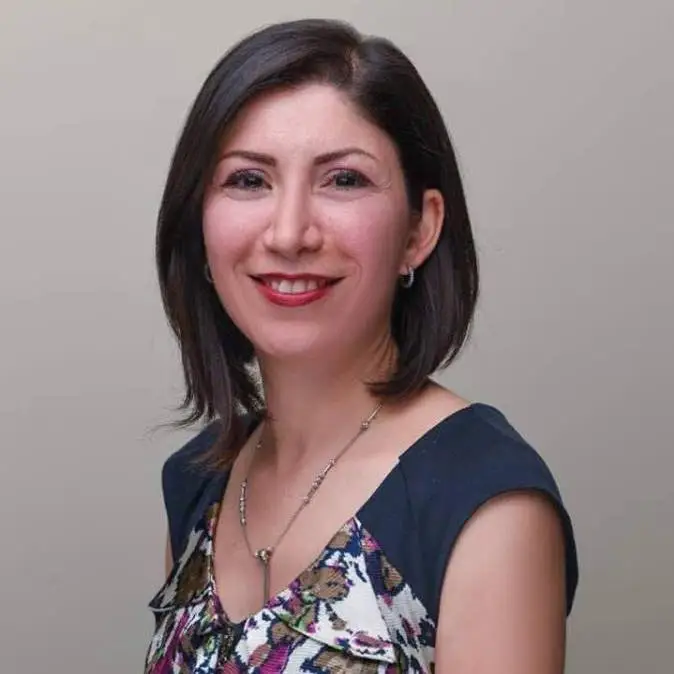
Dr Anahita Malek is an Associate Professor and Head of the Graduate School at Buckinghamshire New University. With multidisciplinary experience across fields, her work centres on co-creation, social innovation, and sustainable development, with practical applications in regional planning, tourism, and the creative industries. Beyond academia, Dr. Malek is actively involved in international consultancy projects, mentoring, and designing training programmes. Her work bridges theory and practice, supporting sustainable growth and driving innovation in organisational development.
Olga Tzatzadaki, PhD, Postdoctoral Researcher, University Ca’Foscari of Venice-Italy
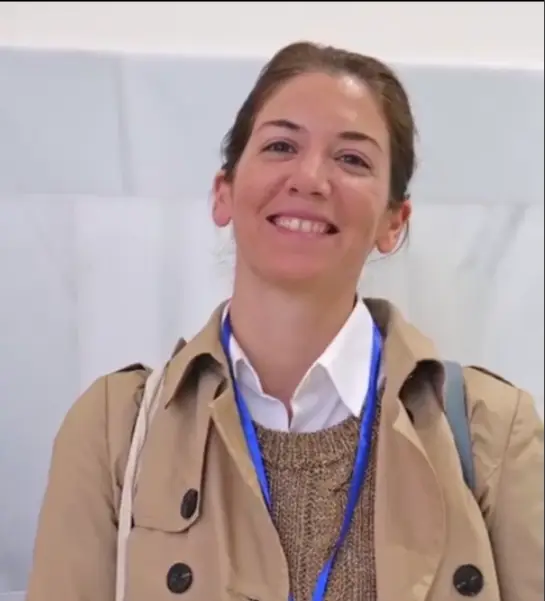
Olga Tzatzadaki is a postdoctoral researcher at Ca’ Foscari University of Venice, working on the iNEST project (Spoke 6) focused on Tourism, Culture, and Creative Industries. Her research explores social innovation in tourism and bottom-up cultural heritage initiatives in areas affected by overtourism and depopulation. She previously taught Urban Sociology at IUAV University and tutors in participatory planning. Olga holds degrees in Urban Planning, Civil Engineering, and Public Policy, and completed her PhD at IUAV. Her work combines academic research with practical experience across Italy and Greece, focusing on community empowerment, participatory processes, and the socio-spatial dimensions of urban life.
Venue & Accommodation
Since 2022, we have been organising our conferences in both on-site and online formats, allowing participants to join either in person or virtually, depending on their preferences or circumstances.
The SPACE International Conference 2025 on Sustainable Architecture, Planning and Urban Design will take place at The Rembrandt Hotel, London. You are warmly invited to join us at the venue and be part of the in-person experience.
If you’re unable to attend in person, not to worry—upon registering under one of the Virtual Participant categories, you will receive a Microsoft Teams link ahead of the event.
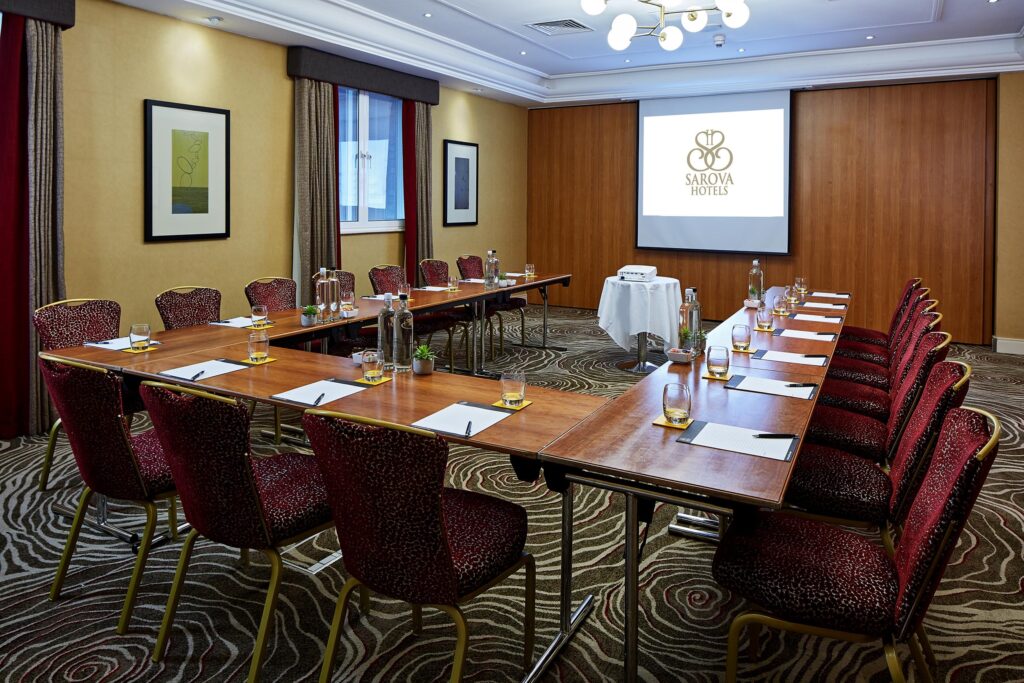
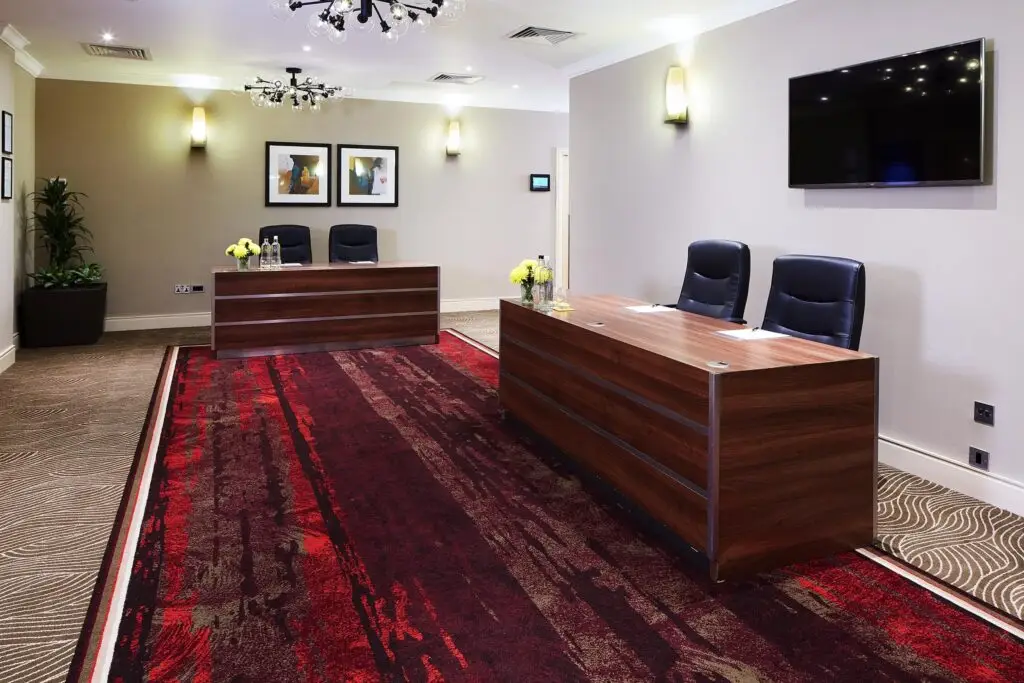
How to get to the Rembrandt?
11 Thurloe Place Knightsbridge
London SW7 2RS
By Tube
Nearest Underground Stations:
South Kensington (District, Circle and Piccadilly Lines)
Knightsbridge (Piccadilly Line)
Sloane Square (Circle and District Lines)
Where to stay?
To support your planning, we’ve partnered with Stay22 to provide convenient access to nearby accommodation at competitive rates. The interactive map below offers a range of hotel options within walking distance of the venue, allowing you to easily compare and book your stay. To ensure access to these rates, please make your booking directly through the map.
Registration
We offer different pricing tiers based on membership level. We provide three main registration rates for all attendees: an Early Bird Rate (discounted for those who register in advance), a Standard Rate, and a Late Registration Rate (for last-minute sign-ups). Your membership level determines the final price you pay, with discounts available for Standard, Premium, and Industry members.
Please check the registration deadlines for Early Bird, Standard, and Late Registration to ensure you secure the best rate.
STUDENT REGISTRATION FEES
Students who register as basic members automatically receive a 30% discount on conference fees, making participation more accessible while maintaining high-quality learning and networking opportunities. Additional discounts are available for student members who upgrade to a Standard or Premium membership.
| Early-Bird Registration Rates | Standard Registration Rates | Late Registration Rates | |
| Presenter Categories | |||
| Author (Student) | £350 | £385 | £425 |
| Oral Presentation Only – On-site (Student) | £280 | £310 | £340 |
| Oral Presentation Only – Virtual (Student) | £210 | £230 | £255 |
| Virtual Presentation (Student) | £280 | £310 | £340 |
| Additional Paper (Student) | £180 | £180 | £180 |
| Non-Presenter Attendee Categories | |||
| Attendee (Student) | £105 | £115 | £125 |
| Virtual Attendee (Student) | £35 | £40 | £45 |
| Early-Bird Registration Rates | Standard Registration Rates | Late Registration Rates | |
| Presenter Categories | |||
| Author (Student) | £315 | £350 | £380 |
| Oral Presentation Only – On-site (Student) | £250 | £280 | £305 |
| Oral Presentation Only – Virtual (Student) | £190 | £210 | £230 |
| Virtual Presentation (Students) | £250 | £280 | £305 |
| Additional Paper (Student) | £180 | £180 | £180 |
| Non-Presenter Attendee Categories | |||
| Attendee (Student) | £95 | £105 | £115 |
| Virtual Attendee (Student) | £30 | £35 | £40 |
| Early-Bird Registration Rates | Standard Registration Rates | Late Registration Rates | |
| Presenter Categories | |||
| Author (Student) | £280 | £310 | £340 |
| Oral Presentation Only – On-site (Student) | £225 | £245 | £270 |
| Oral Presentation Only – Virtual (Student) | £170 | £185 | £205 |
| Virtual Presentation (Student) | £225 | £245 | £270 |
| Additional Paper (Student) | £180 | £180 | £180 |
| Non-Presenter Attendee Categories | |||
| Attendee (Student) | £85 | £90 | £100 |
| Attendee | £115 | £125 | £135 |
| Virtual Attendee (Student) | £25 | £30 | £35 |
| Virtual Attendee | £35 | £40 | £45 |
INDIVIDUAL REGISTRATION FEES
| Early-Bird Registration Rates | Standard Registration Rates | Late Registration Rates | |
| Presenter Categories | |||
| Author | £500 | £550 | £605 |
| Oral Presentation Only – On-site | £400 | £440 | £485 |
| Oral Presentation Only – Virtual | £300 | £330 | £365 |
| Virtual Presentation | £400 | £440 | £485 |
| Additional Paper | £200 | £200 | £200 |
| Non-Presenter Attendee Categories | |||
| Attendee | £150 | £165 | £180 |
| Virtual Attendee | £50 | £55 | £60 |
| Early-Bird Registration Rates | Standard Registration Rates | Late Registration Rates | |
| Presenter Categories | |||
| Author | £400 | £440 | £485 |
| Oral Presentation Only – On-site | £320 | £350 | £390 |
| Oral Presentation Only – Virtual | £240 | £265 | £290 |
| Virtual Presentation | £320 | £350 | £390 |
| Additional Paper | £200 | £200 | £200 |
| Non-Presenter Attendee Categories | |||
| Attendee | £120 | £130 | £145 |
| Virtual Attendee | £40 | £45 | £50 |
| Early-Bird Registration Rates | Standard Registration Rates | Late Registration Rates | |
| Presenter Categories | |||
| Author | £375 | £415 | £455 |
| Oral Presentation Only – On-site | £300 | £330 | £365 |
| Oral Presentation Only – Virtual | £225 | £250 | £270 |
| Virtual Presentation | £300 | £330 | £365 |
| Additional Paper | £200 | £200 | £200 |
| Non-Presenter Attendee Categories | |||
| Attendee | £115 | £125 | £135 |
| Virtual Attendee | £35 | £40 | £45 |
INDUSTRY REGISTRATION FEES
| Early-Bird Registration Rates | Standard Registration Rates | Late Registration Rates | |
| Presenter Categories | |||
| Industry Showcase | £675 | £750 | £825 |
| Virtual Industry Showcase | £540 | £600 | £660 |
| One-day Exhibitor | £675 | £750 | £825 |
| Two-days Exhibitor | £1125 | £1250 | £1375 |
| Non-Presenter Attendee Categories | |||
| Attendee | £200 | £220 | £240 |
| Virtual Attendee | £70 | £75 | £85 |
| Early-Bird Registration Rates | Standard Registration Rates | Late Registration Rates | |
| Presenter Categories | |||
| Industry Showcase | £610 | £675 | £745 |
| Virtual Industry Showcase | £485 | £540 | £595 |
| One-day Exhibitor | £610 | £675 | £745 |
| Two-days Exhibitor | £1015 | £1125 | £1240 |
| Non-Presenter Attendee Categories | |||
| Attendee | £180 | £200 | £220 |
| Virtual Attendee | £65 | £70 | £80 |
| Early-Bird Registration Rates | Standard Registration Rates | Late Registration Rates | |
| Presenter Categories | |||
| Industry Showcase | £575 | £640 | £700 |
| Virtual Industry Showcase | £460 | £510 | £560 |
| One-day Exhibitor | £575 | £640 | £700 |
| Two-days Exhibitor | £960 | £1065 | £1170 |
| Non-Presenter Attendee Categories | |||
| Attendee | £170 | £190 | £205 |
| Virtual Attendee | £60 | £65 | £75 |
| Early-Bird Registration Rates | Standard Registration Rates | Late Registration Rates | |
| Presenter Categories | |||
| Industry Showcase | £540 | £600 | £660 |
| Virtual Industry Showcase | £430 | £480 | £530 |
| One-day Exhibitor | £540 | £600 | £660 |
| Two-days Exhibitor | £900 | £1000 | £110 |
| Non-Presenter Attendee Categories | |||
| Attendee | £160 | £175 | £195 |
| Virtual Attendee | £55 | £60 | £70 |
NOTES FOR CATEGORIES
Author Category
Authors in this category must submit their full paper by the designated deadline and personally attend the conference on-site to present their work. This category includes:
- Access to all sessions and discussions
- Oral presentation of their paper
- Publication of their article in the SPACE Studies Journal of International Conference Proceedings
- Presentation certificate
- Coffee breaks, lunches, and networking event/s
- Conference bag and accessories
Oral Presentation Only – On-Site
This category is for authors who will present their work on-site at the conference but will not submit a full paper. Instead, only the abstract will be published in the SPACE International Conferences Annual Abstract Book. Authors may choose to submit either:
- Their abstract, or
- An extended abstract (max. 1000 words)
Poster presentations must also be presented as PowerPoint presentations during the designated presentation slot, as posters cannot be shown to online attendees. Posters will still be displayed at the venue and uploaded to the posters section on the conference webpage after the conference.
This category includes:
- Access to all sessions and discussions
- Oral and poster presentation opportunities
- Presentation certificate
- Coffee breaks, lunches, and networking event/s
- Conference bag and accessories
Oral Presentation Only – Virtual
This category is for authors who will present their work virtually via Microsoft Teams but will not submit a full paper. Only the abstract will be published in the SPACE International Conferences Annual Abstract Book. Authors may choose to submit either:
- Their abstract, or
- An extended abstract (max. 1000 words)
Poster presentations must also be prepared as PowerPoint presentations and presented during the designated slot to ensure accessibility for both on-site and online attendees. Posters will be uploaded to the posters section of the conference webpage.
This category includes:
- Virtual oral presentation
- Access to all sessions and discussions
- Virtual presentation certificate
Attendee – On-Site
This category is for participants who wish to attend the conference without presenting a paper. It is ideal for industry professionals, researchers, students, and anyone interested in gaining insights from the discussions and networking opportunities.
On-site attendees receive:
- Access to all sessions and discussions
- Attendee certificate
- Coffee breaks and lunch(es)
- Networking event/s
- Conference bag and accessories
Attendee – Virtual
This category is for participants who wish to attend the conference online without presenting a paper. Virtual attendees can engage in discussions and watch presentations via live streaming.
Virtual attendees receive:
- Access to all live-streamed sessions and discussions
- Virtual attendee certificate
CANCELLATION
| CANCELLATION TIME | REFUNDING PERCENTAGE |
|---|---|
| 60 days before the conference | 75% of the registration fee (additional pages and papers included) |
| Less than 60 but more than 30 days before the conference | 50% of the registration fee (additional pages and papers included) |
| less than 30 days before the conference | none |
Please, note that all the transaction costs are taken from the canceler’s refund balance, and the refund is done after the conference even if the conference has been postponed to a later date.
For full details regarding registration, membership requirements, and refund policies, please refer to our Terms and Conditions for SPACE Studies Conferences.
GENERAL INFORMATION ABOUT REGISTRATION
The review process for full papers submitted for publication begins after the conference has taken place. Only papers that are presented at the conference (either onsite or virtually) will be considered for publication in the SPACE Studies journal or proceedings.
We strongly encourage accepted presenters to register as soon as possible after receiving their acceptance, even if their paper is not yet ready. Uploading your full paper is a separate step and can be completed later, but registration is required to secure your place in the programme.
- If the paper has more than one author, all the authors attending the conference should register for the conference by paying the related category fee.
- All poster presentations should be registered in the Oral Presentation Category.
- Invitation letters will only be issued once the participant’s registration and payment have been completed.
- Invitation letters will be sent by e-mail.
- Conference presenter and non-presenter attendee certificates will be sent after the conference.
- Listeners can register and pay their registration fee at the conference registration desk during the conference although we recommend you to secure your spot as it is limitted.
- For any other questions, please write to space@spacestudies.co.uk




